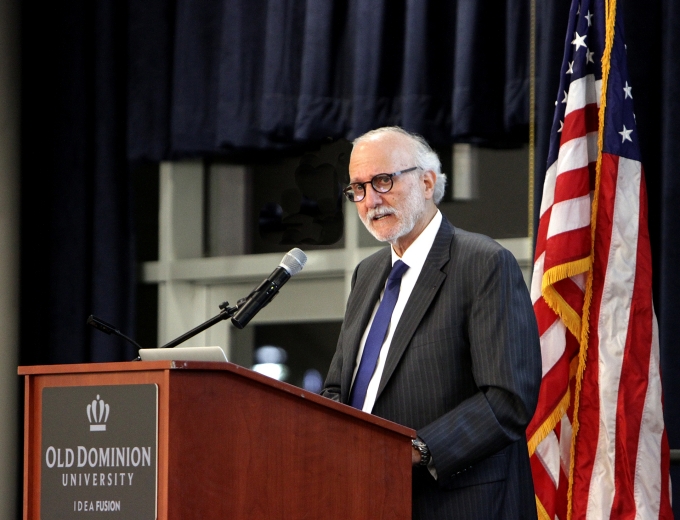Wrongly Imprisoned by Cuban Government, Alan Gross Shares his Story in Annual Wallenberg Lecture
February 25, 2016
 Alan Gross spoke February 23 at Old Dominion University
Alan Gross spoke February 23 at Old Dominion University
"I heard a pounding at my Havana hotel door room," Alan Gross told a rapt audience at Old Dominion University, knocking on the microphone to mimic the sound. "I soon learned what hell waited for me."
For Gross, that hell involved five years in a Cuban prison, falsely accused by the Castro regime of activities counter to Cuban interests.
Released in December 2014 after nearly 1,900 days in captivity, Gross has only begun to tell his story. He related his ordeal to an audience of 350 during the Marc and Connie Jacobson Raoul Wallenberg Humanitarian Lecture, part of the university's President's Lecture Series.
Gross spoke February 23 at the Ted Constant Convocation Center about becoming a pawn in five decades of geopolitical struggle between the world's remaining superpower and the island nation that so bitterly opposes it.
"The Cuban government said I was arrested for spying. I say I was kidnapped and held for ransom. If I had actually been a spy, my tenure there would have been much shorter," he said.
Gross said he suspects the Cuban government was seeking the release of five intelligence officers being held in the United States on long prison sentences.
"They wanted to kidnap a U.S. citizen and hold him or her hostage until the U.S. paid a ransom. So the Cuban government chose a soft target. Me," Gross said. "This is what the government of Cuba wanted from the beginning. They wanted to poke Uncle Sam in the eye and try to leverage my detention as a way to free their intelligence agents."
Gross fought poverty and oppression in more than 50 countries in the Middle East, Europe, Asia and Africa before being abruptly arrested by Cuban officials. He was, in fact, working on a humanitarian project to improve wireless access for small communities across Cuba, with a special emphasis on helping the country's small Jewish community.
While incarcerated, Gross lost more than 100 pounds and five teeth because of malnutrition. But he said the imprisonment was harder on his family than it was on him. "One of my daughters had a major illness and had to go through treatment. One of my other daughters had her gall bladder removed and, on the anniversary of my detainment, had a horrific automobile accident."
During his time in prison, Gross lost many family members and friends, including his mother. But he told the audience that one constant remained - his wife, Judy. "While all of these family stressors occurred, Judy became the face and voice of my story. She was relentless. She was my champion," he said.
He told the Old Dominion audience that he was sustained by the support of his family and friends, his faith and sense of humor, but also by a very personal connection to Raoul Wallenberg, the namesake of the lecture.
Gross said six of his relatives, five brothers and a sister, survived the Nazi occupation in Hungary thanks in part to the humanitarian efforts of Wallenberg. "They survived an ordeal far greater than the one I was facing. So it wasn't in my genetic makeup to quit."
A Swedish businessman and diplomat, Raoul Wallenberg was one of the few who dared to defy the perpetrators of the Holocaust. Persuading the Swedish Foreign Ministry to send him to Hungary on a diplomatic passport in 1944, he led a daring mission to save many of the remaining Jews in Budapest who had not been deported to Nazi death camps. Wallenberg helped shelter several thousand Jews in "protected houses" that flew the flags of Sweden and other neutral countries. After being captured by the Soviet Union in 1945, Wallenberg reportedly died of a heart attack in a Moscow prison in 1947.
The U.S. Congress, in 1981, granted honorary citizenship to Wallenberg, an honor that had been bestowed only once before, to Winston Churchill.
The annual Wallenberg Lecture is sponsored by the Marc and Connie Jacobson Philanthropic Foundation, as part of ODU's President's Lecture Series. Speakers for the Wallenberg Lecture are chosen by the university. They must be humanitarians and balanced in their philosophical beliefs.
The President's Lecture Series serves as a marketplace for ideas, featuring fascinating personalities who share their knowledge, experience, opinions and accomplishments. Discussing timely topics, the series puts diversity first, offering an international lineup of authors and educators, business innovators and political figures.

